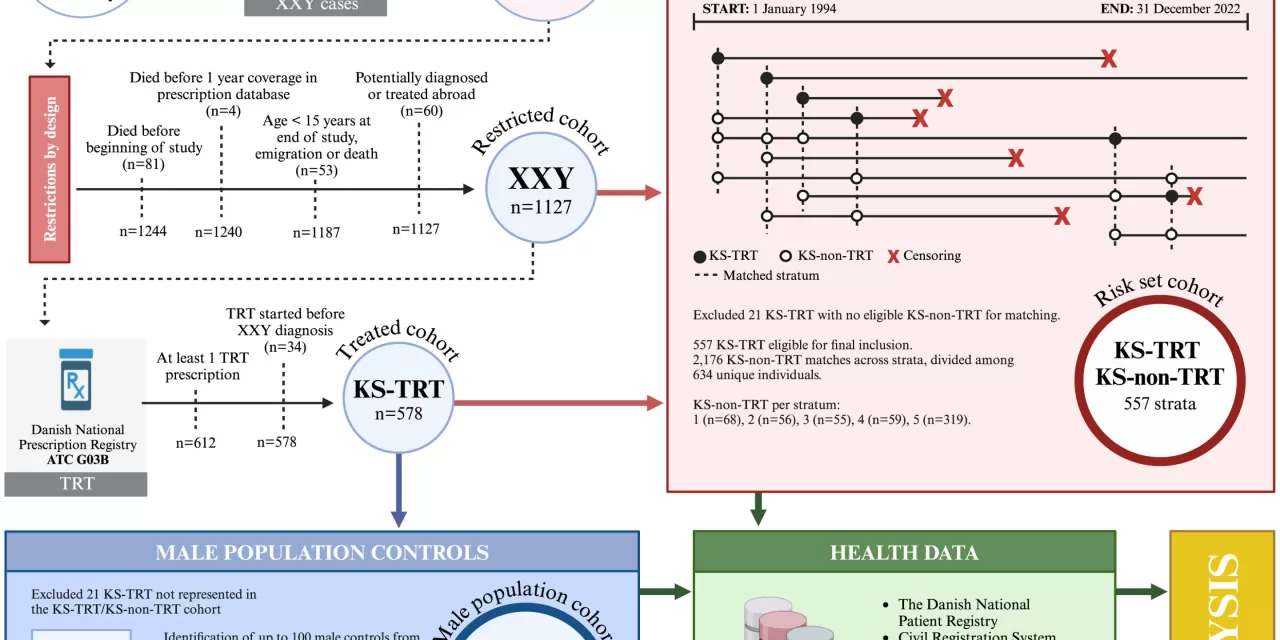A groundbreaking Danish study has revealed that testosterone treatment can significantly improve both the quality of life and lifespan of men with Klinefelter syndrome (KS). The study, published in The Lancet Regional Health—Europe, provides crucial evidence that proper treatment can nearly halve the mortality rate among affected individuals.
A Common Yet Underdiagnosed Condition
Klinefelter syndrome is the most common sex chromosome disorder in men, affecting approximately one in 600 male births. The condition results from an extra X chromosome, leading to low testosterone levels, which in turn increase the risk of cardiovascular disease, type 2 diabetes, and a higher overall mortality rate. Despite these risks, more than half of all men with KS remain undiagnosed, and among those who do receive a diagnosis, only about half receive the necessary treatment.
Significant Reduction in Mortality Rates
This latest study, conducted by researchers at Aarhus University and Aarhus University Hospital, is the first large-scale study to document the clinical effects of testosterone therapy for men with KS.
“Our previous studies have shown that men with KS have a significantly higher risk of developing a range of diseases. However, we did not know to what extent testosterone treatment could reduce this risk,” said postdoctoral researcher and MD Simon Chang. “Now, we have strong evidence that testosterone therapy can save lives.”
The study found that men who received testosterone therapy had significantly lower mortality rates, approaching those of the general population.
The Role of Testosterone in Health
Researchers believe that testosterone therapy improves metabolism, increases muscle mass, and reduces body fat, which may contribute to the lower mortality rates.
“Testosterone is a powerful hormone that affects nearly every function in the body. We also suspect that it may have positive effects on the immune system, bone health, and possibly even cognitive functions,” Chang explained.
Safety and Side Effects
The study confirms that testosterone therapy does not increase the risk of serious cardiovascular diseases, heart attacks, or strokes. However, there is a slightly increased risk of heart failure among men undergoing treatment.
“It is important to emphasize that the benefits far outweigh the potential drawbacks. The reduction in mortality is so significant that it outweighs concerns about a potential increased risk of heart failure,” Chang added.
Future Implications and Guidelines
New international guidelines for the treatment of KS are currently in development and are expected to be released in 2027. Researchers anticipate that this study’s findings will directly influence these guidelines, potentially improving, prolonging, and saving lives for many men with KS.
“We expect the new guidelines to recommend initiating testosterone treatment as soon as the diagnosis is made,” said Chang.
The Need for Early Diagnosis
Despite the clear benefits of testosterone therapy, many men with KS remain undiagnosed. A simple screening test at birth could help identify affected individuals early, allowing for timely intervention.
Experts stress the importance of increased awareness and screening to ensure that more men with KS receive the life-saving treatment they need.
Disclaimer: This article is for informational purposes only and should not be considered medical advice. Individuals with Klinefelter syndrome or other medical conditions should consult a healthcare professional before making any decisions regarding treatment.












